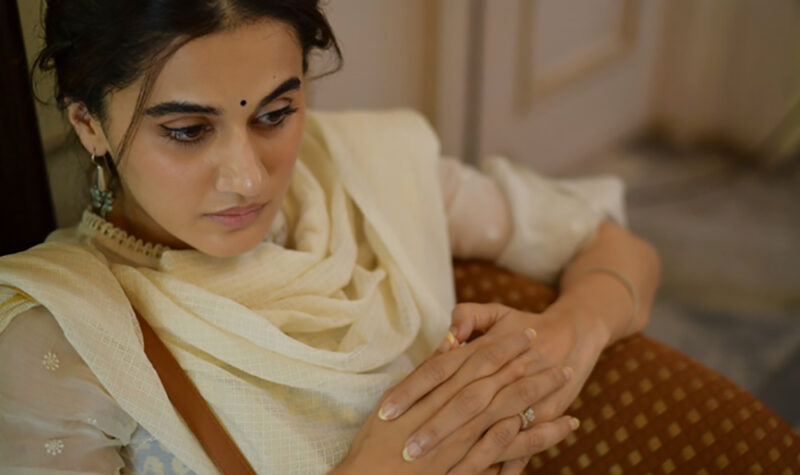“Thappad” by director Anubhav Sinha is an exploration of how an Indian woman perceives her life, and how deep-rooted patriarchy marks its presence in the smallest corners of our society. The film is a reflection of reality into how society has demarcated the roles of men and women in marriage. Anubhav Sinha has managed to capture the story of not one marriage but, rather many marriages across the barrier of social class. Sinha has managed to highlight this intersection of communities which binds women’s struggle beyond any social statures.
The film starts with an elegant ruse showing how various characters of the film—regardless of their social status— are enjoying an orange popsicle with different emotions. The film starts with happy Delhi homemaker Amrita (Tapsee Pannu) with her husband Vikram (Pavail Gulati)—she is a perfect woman society expects her to be. She enjoys life in the smallest of pleasures, may it be her morning chai or her dance lessons. Her happiness lies in the happiness and welfare of her family. Soon, Vikram is offered a position in his London office and she throws a party. However, in the middle of the party, Vikram gets a call from his office informing that his promotion has been compromised.
Cinematographer Soumik Mukherjee and editor Yasha Ramchandani have done a flawless job of highlighting her happiness in the initial scenes where the audience also shares a smile or two. The jokes, dances, and songs sway the audience into what seems ideal happiness. However, the most difficult part enters when Vikram slaps Amrita as she tries to hold him back from being violent on his boss. The theme changes dramatically. To what seemed like a happy narrative is changed with that one slap.
That scene changes so many equations of relationships. Amrita, once a happy homemaker who loved her husband dearly does not find that love for him anymore; in some ways she loses her self-worth too. Amrita is shaken and when it is clearly visible, her mother-in-law states that its best she resists her anger, i.e. to comprise for the sake of the relationship. Vikram oblivious to the gravity of his action tries and justifies his actions by saying he was angry and did not intend for the same to happen.

Amrita leaves for her parents home, trying to understand herself while understanding her relationship with Vikram. She gets in touch with a famous lawyer, Netra Jaisingh (Maya Sarao). Netra is dealing with her own set of problems while having an affair and trying to be the ideal woman even though she is an acclaimed female icon. The film gravels with the legal battle, bringing into question the custody of their unborn child and ultimately making the audience realise how certain relations change with a divorce and their aftermath.
The true value to the film is brought by its supporting cast, right from the maid Sunita (Geetika Vidya Ohlyan), the lawyer Netra, Amrita’s mother (Ratna Pathak Kapoor), and Amrita’s next-door neighbour Shivani (Dia Mirza) who is also a single mother and businesswoman; they form such a strong narrative for the message this film tries to give.
“Thappad” is unconventional in its narration since it does not portray the husband to be stereotypical or evil. This makes the character very relatable to the men we encounter in our day to day life. It is very evident that he loves his wife dearly but, his conditioning and nurturing is a product of patriarchy which gives him a sense of entitlement. The same ideas are also propelled in the fact that some of the women in the film also realise how they are a product of “Patriarchy.” Just as Sinha starts the film with all of these characters showing the common thread of popsicles, patriarchy also runs through all of us.
Sinha’s canny and intricate construction of the film’s action and dialogue make “Thappad” his most developed and original film. But he doesn’t risk breaking his own frames to acknowledge the offscreen dramas, the lives behind the characters, and what his movie implies for them. I highly recommend this film to everyone who wants to unlearn patriarchy.


